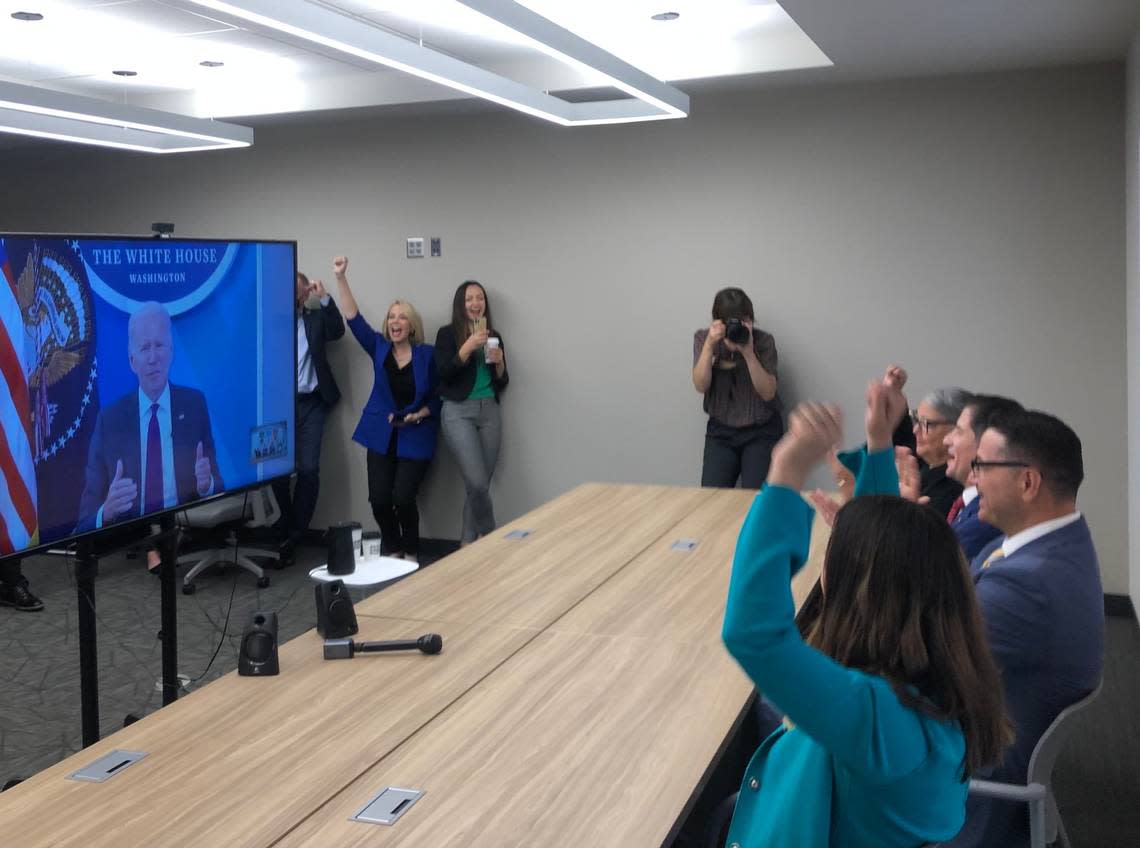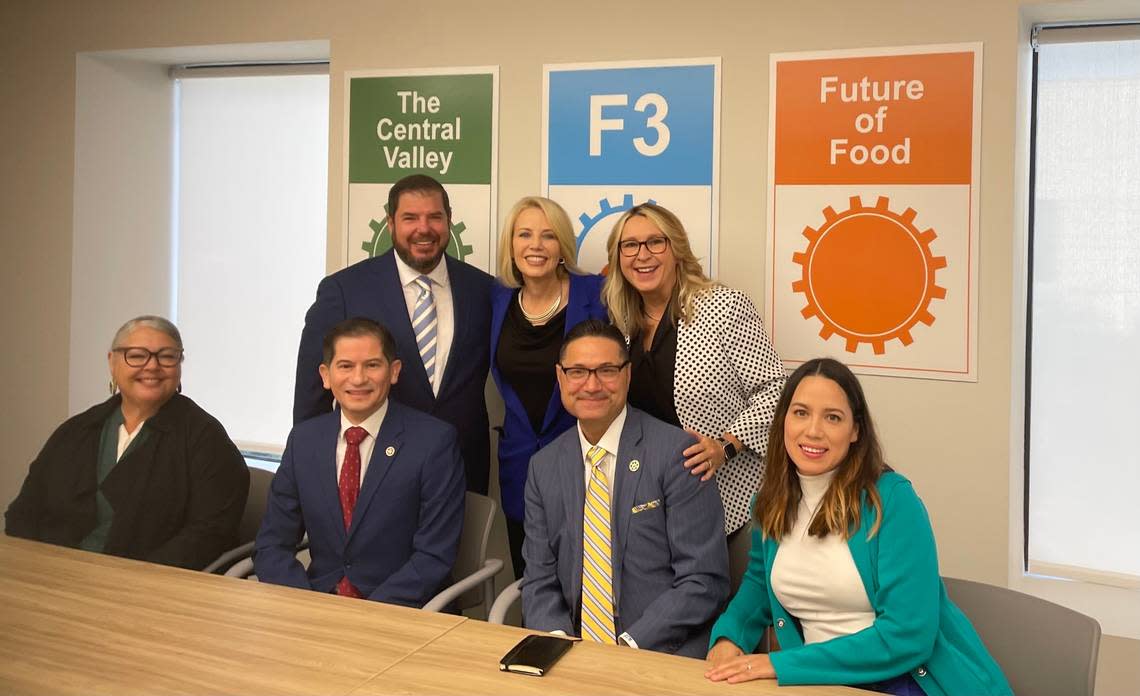Will Central Valley leaders embrace ‘equity’ in $65 million Build Back Better project?
Central San Joaquin Valley community and education leaders marked the announcement of millions in federal funds to build a resilient, regional and tech-oriented agricultural economy by vowing to correct “mistakes of the past” and build a more “inclusive” regional economy.
The Fresno-Merced Future of Food Innovation Coalition, or F3, celebrated the news that they received a $65.1 million federal grant, the largest awarded under the Build Back Better Regional Challenge. F3 is a coalition that operates under the Fresno DRIVE initiative and is sponsored by the Central Valley Community Foundation.
This program “will empower agricultural workers in Fresno, California,” President Joe Biden said in a virtual meeting with grantees on Friday morning.

The grant funding is part of a $1 billion effort launched by the Biden administration as part of the American Rescue Plan designed “to boost economic recovery from the pandemic and rebuild American communities, including those grappling with decades of disinvestment,” according to the U.S. Economic Development Administration’s website.
“Together, we create a new, innovation-driven, inclusive economy and that, I will say, has not been the way we’ve worked in the past in the Valley,” said Ashley Swearengin, former mayor of Fresno and president and chief executive officer of the Central Valley Community Foundation, during a news conference on Friday.
F3 coalition leaders pledged to invest in overlooked communities, such as farmworkers and small farmers, and that they’ll work to create a vibrant, regional food system and economy.
According to a fact sheet on the F3 coalition produced by the Central Valley Community Foundation, the grant funds will drive both “economic growth and equity” by investing in three primary areas: the “AgTEC” workforce, a local farm and food innovation initiative, and “iCREATE,” an initiative that will develop industry-academic partnership to create ag-tech innovations.
“To me, a big part of what it (F3) represents is understanding our past, and not repeating mistakes of the past, and actually correcting mistakes of the past,” Swearengin said.

A tech-ready agriculture workforce
Education leaders from community colleges in the five-county region pledged to help students — including thousands of farmworkers — adapt to the new ag-tech opportunities.
“We recognize with technology that our workers are going to lose jobs,” Chris Vitelli, president and superintendent of Merced College, said. “And when they lose jobs, it’s our job to upskill them.”
Under its “AgTEC” initiative led by Merced College, the F3 coalition said it will train a minimum of 8,400 individuals — 4,200 of which will be “incumbent workers” already in the agriculture workforce, Vitelli said. The program will provide job skills training and certification for farmworkers and food industry workers, especially low-wage workers whose jobs are likely to be eliminated by automation.
Education leaders say the workforce training could have ripple effects for Valley families and their economic well-being.
“That’s 8,400 families that feed the Valley,” said Carole Goldsmith, chancellor of the State Center Community College District. “So this is a great day for families; this is a great day of hope and possibilities.”
F3 aims to double the annual ag-tech workforce pipeline in four years, and enable an increase in average wages of 60%, according to an F3 fact sheet.
F3: The Future of Food Initiative by Melissa Montalvo on Scribd
Appropriate technology for small Central Valley farmers
F3 also promises to help small farmers navigate the challenges that face the region through access to cost-saving, affordable technologies.
And while the F3 initiative has goals to develop 100 ag-tech innovations and commercialize 40% of them through its iCREATE industry-academic partnerships, Swearengin said they also want to be mindful of how these technologies will impact small farmers.
“I always just thought it would be so cool if you gave money to scientists to invent new stuff and somehow new businesses will be formed and somehow the people of communities would benefit from higher-paying jobs – like it would just magically happen,” Swearengin said.
She credited Ruth Dahlquist-Willand, a farm adviser with the University of California Agriculture and Natural Resource Center, for guiding F3 on understanding that innovation and research should be informed by the people who are on the front line – such as small farmers, workers and small business owners.
“People are worried that if you give money to universities to invent stuff, the stuff they invent might not actually help the people that they’re intending to help,” Swearengin said. “It could actually create a lot of harm.”
Dahlquist-Willand, who leads the Local Food and Farming Initiative portion of F3, said during the event that their goal is to support small farmers while also building a stronger local food economy.
“It’s not top down,” she said. “It’s really trying to reach out and involve people so that they’re not just receiving information or technology or something that’s imposed on them.”
She said her partners on the LFFI are working to provide “appropriate technology” — for instance, labor-saving tech that helps small farmers with ongoing labor shortages.
This means “it’s not too expensive, it’s not hard to fix, it doesn’t require a long-term expensive contract, and it’s something you could use yourself on a small scale,” Dahlquist-Willand said.
A more equitable regional food system
A number of community and coalition partners want to create a stronger food system in Fresno that creates local jobs, facilitates opportunities for small businesses, and serves vulnerable communities, Dahlquist-Willand said.
The F3 investment is a chance to inspire more local food businesses to use ingredients from local farms in their products, she said, and pointed to Ampersand ice cream as a model for other businesses.
“Why should we buy stuff from Florida or Arizona to put in our restaurants?” she asked. “Can we use what we have here and really value that, and maybe even show the value we’re willing to pay for it?”
As for creating a more equitable food system, Cultiva La Salud will work on an F3 initiative to engage mobile food vendors to deliver fresh produce to food-insecure communities.
The Build Back Better grant is an opportunity to “rectify” food access in the region, said Genoveva Islas, founder and director of Cultiva La Salud and a Fresno Unified School District trustee, during Friday’s news conference.
Better access to nutritious food “can reduce the obesity and the chronic disease that’s experienced here in the Central Valley,” Islas said. These preexisting conditions led to “a lot of the ill health and death that we’ve seen as a result of COVID.”
Ultimately, Islas said, “this is not just about economics, it’s not just about jobs, it’s not just about our economy. It is really about transforming our communities for the better.”
